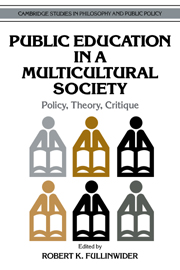Book contents
- Frontmatter
- Contents
- Contributors
- Preface
- PART I INTRODUCTION AND CRITIQUE
- 1 Multicultural education: concepts, policies, and controversies
- 2 Antiracist civic education in the California History–Social Science Framework
- 3 A conflict of visions: multiculturalism and the social studies
- PART II CULTURE AND IDENTITY
- PART III RELATIVISM, REASON, AND PUBLIC EDUCATION
- PART IV TEACHING HISTORY
- PART V TEACHING LITERATURE
- Index
3 - A conflict of visions: multiculturalism and the social studies
Published online by Cambridge University Press: 05 June 2012
- Frontmatter
- Contents
- Contributors
- Preface
- PART I INTRODUCTION AND CRITIQUE
- 1 Multicultural education: concepts, policies, and controversies
- 2 Antiracist civic education in the California History–Social Science Framework
- 3 A conflict of visions: multiculturalism and the social studies
- PART II CULTURE AND IDENTITY
- PART III RELATIVISM, REASON, AND PUBLIC EDUCATION
- PART IV TEACHING HISTORY
- PART V TEACHING LITERATURE
- Index
Summary
In the extraordinary debate over multicultural education, Americans are struggling to define how they want their children to see themselves, their nation, and the world. Important matters are at stake. In a country that celebrates diversity, agreement on an irreducible, universal core of basic knowledge remains elusive, especially as the franchise of “diversity” expands beyond race and religion to encompass gender, sexuality, and disability. Multicultural education has become a pressing issue not only for elected officials and prominent combatants in the “culture wars,” but also for councils trying to set national curriculum standards, test designers, educational publishers, and professors of education and the humanities.
The pressure for multiculturalism and multicultural education is not hard to understand. American elementary and secondary schools, especially in metropolitan areas, have increasingly large proportions of black, Hispanic, and Asian students. The multiethnic nature of the United States, and more intimate cultural and commercial relations between nations and continents, make any “monocultural” curriculum or “canon” seem provincial and obsolete.
On the face of it, multicultural education may seem an unlikely catalyst of division and controversy. Most scholars, educators, and policymakers agree on some central points: that social studies ought to recognize and respect cultural diversity; that children should not be given sanitized or ethnocentric versions of history; that race, gender, and class should have a place in historical explanations; that schools should teach students to respect one another, to appreciate he customs, religions, and languages that differentiate them, and to see the commonalities that lie behind their differences.
- Type
- Chapter
- Information
- Public Education in a Multicultural SocietyPolicy, Theory, Critique, pp. 49 - 62Publisher: Cambridge University PressPrint publication year: 1996
- 3
- Cited by



